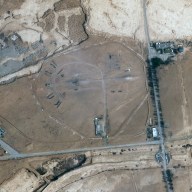 Serbian and Cossack armed men work with Pro-Russian forces as they stand guard at a check point on the road from Simferopol to Sevastopol on March 13, 2014. Several Serbian war veterans identifying themselves as Chetniks have joined pro-Russian troops in Ukraine’s Crimea region. Less than three weeks after gunmen seized Crimea’s parliament and installed a pro-Moscow government, voters here head to the polls on March 16 for a vote set to cement Russia’s takeover of the strategic peninsula.
Serbian and Cossack armed men work with Pro-Russian forces as they stand guard at a check point on the road from Simferopol to Sevastopol on March 13, 2014. Several Serbian war veterans identifying themselves as Chetniks have joined pro-Russian troops in Ukraine’s Crimea region. Less than three weeks after gunmen seized Crimea’s parliament and installed a pro-Moscow government, voters here head to the polls on March 16 for a vote set to cement Russia’s takeover of the strategic peninsula.
Credit: Getty Images
This Sunday, residents of Crimea go to the polls in a referendum to decide the region’s future.
On the ballot: a confederation-like relationship with Ukraine, or annexation by Russia. But the international community has denounced the referendum. The G7 countries said in a statement that Crimea’s secession will have “no legal effect” and that the group will not recognize the outcome.
Metro spoke with Dr. Andreas Umland, an associate professor of European Studies at the National University of Kyiv-Mohyla Academy in Kiev.
Metro: What’s the purpose of the Crimea referendum?
Umland: It’s mainly for domestic consumption and will serve as a justification for Russia to annex Crimea.
Is it a credible vote?
Their referendum doesn’t include an option to vote for independence or to continue the status quo. The only two options are a confederate relationship with Ukraine or annexation to Russia. If the referendum were held under democratic conditions, it’s not clear that the majority would vote for annexation. If they were to choose a confederate relationship with Ukraine, the West would probably be happy. As it stands, the majority will probably seek annexation to Russia, though it’s unclear how credible such a vote would be. Though there will most likely be election observers from the CIS [Commonwealth of Independent States, former Soviet Republics], there will be no really independent observers.
So we shouldn’t trust the outcome?
It’s not really a referendum, but it doesn’t matter to Russia, as it could probably get away with an annexation anyway. But now it can say, “See, people voted for annexation”. Even so, since annexing Crimea would be a clear breach of international law, Russia may opt to give it the same status as Transnistria and Abkhazia.
















